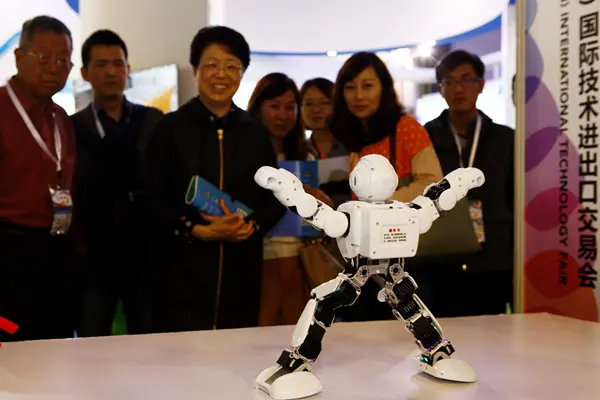The 1st Maritime-Continental Silk Road Cities Forum hosted by Fuzhou on 18 May is very timely, said Ralf Bredel, the Representative of the United Nations Industrial Development Organization (UNIDO) and Head of UNIDO’s Regional Office for China, the Democratic People’s Republic of Korea and Mongolia.
“By aiming at providing a platform for cities along the Maritime-Continental Silk Road to enhance economic, industrial and trade cooperation,” Bredel said, “the Forum will provide an important opportunity for Fuzhou to exhibit its success stories and expand its influence, domestically and globally.”
The Director General met with Lou Jiwei, Minister of Finance on Jun. 11, 2015. He briefed Lou on UNIDO’s new mandate ISID.
As a pillar for the “Belt and Road” Initiative, Fuzhou has made full use of its unique geographical advantages. “Located on China’s southeast coast, Fuzhou has been an important starting point of the ancient Maritime Silk Road for over one thousand years,” Bredel said, ”and now is a strategic portal linking China with the Asia Pacific Economic Circle and the European economic circle.”
Being the hometown of numerous Chinese living throughout the world, Fuzhou bonds with the rest of the world extremely close. Bredel suggested that these close bonds have served as an important momentum for promoting economic, social and cultural exchanges and cooperation with other cities along the “Belt and Road” Initiative.
The city of Fuzhou is just at the right place and at the right time, facing historic opportunities and challenges.
Li Yong, the Director General of UNIDO visits UNIDO Solar Energy Center in Lanzhou, China on Sept. 2, 2014.
“To sharpen its core competitiveness,” Bredel said, ”a city must not only uphold its unique production capability, but also cater to the needs that might come from remote corners of the world.”
Bredel said that in the past, the competitiveness of a city usually relied on local products that were unique to the particular city and were not found in other cities. But this situation has changed with the spread of information technologies and large-scale manufacturing in any given place.
“This is what industrial globalization is all about in the age of global value chains,” he said, “to achieve this, cities need to put in place necessary industrial and other infrastructure to attract investors.”
“Moreover and equally important, it is the responsibility of the city’s administration to help create an enabling policy and business environment,” Bredel added.
Li Yong, Director General of UNIDO, meets with Lou Jiwei, the Chinese Minister of Finance on Jun. 11, 2015.
Bredel suggested that Fuzhou would need to develop innovative industrial systems that will take advantage of the Internet era and new industrial revolution. “The city should also embark on strategic innovation and science and technology R&D in areas of comparative advantage and industrial sectors that can maximize socio-economic benefits and environmental sustainability,” he said.
“It will be imperative for Fuzhou,” he said, “as for other municipalities, to develop talent and human capital with the requisite skills, competencies to take advantage of the human resource needs by the new industrial revolution.”
“This will be critical to ensure a soft landing as the local labor force needs to be prepared for the transition ahead,” he added.
People watch a robot dancing at the 4th China (Shanghai) International Technology Fair at Shanghai World Expo Exhibition & Convention Center on April 21, 2016.
Talking about Fuzhou’s “Internet + Industry” strategy, he said: “the Internet revolution is now driving the transformation in all walks of life.” “It will not replace all traditional industries and manufacturing, but it is a tool that we should use to liberate productive forces,” he said.
Bredel said that he was convinced that it can help transform traditional industries to feature digital and intelligent data, and accelerate the pace of establishing a modern industrial system in Fuzhou, as well as benefit other areas in China.
“Historically, Fuzhou used to be an important city for the Maritime Silk road,” he said, “and I am confident it will continue to be one of the pillars for the ‘Belt and Road’ Initiative in the future.”
(APD)
 简体中文
简体中文

